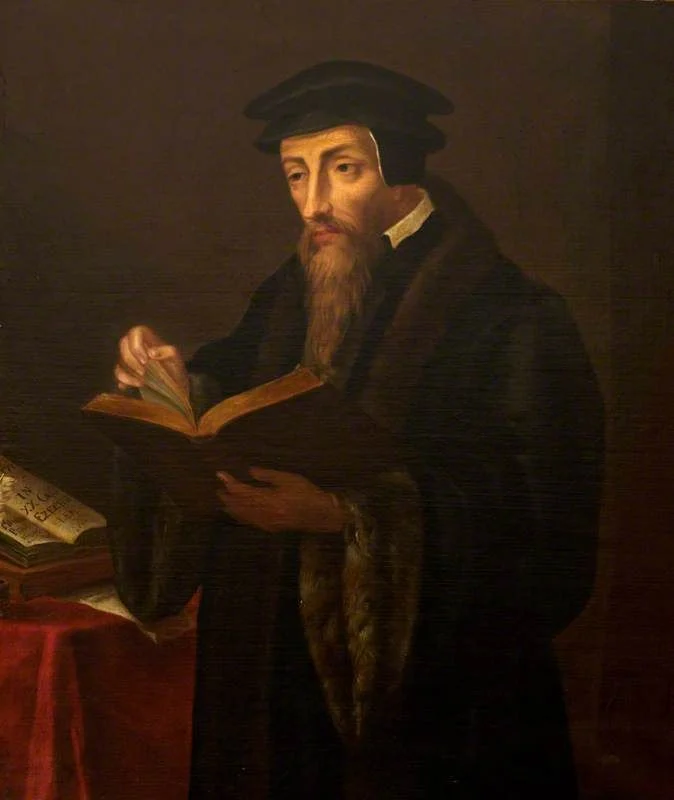The Nationalism of the Protestant Reformation: John Calvin's Biblical Theology of Nationhood

24 October 2023
By Dr Adi Schlebuscch
This October marks 506 years since Martin Luther initiated the Great Reformation of the Church of Christ. In celebration thereof Pactum will be publishing a series of blog posts on the nationalism of the Reformation in the run-up to Reformation Day on October 31st. Today we're focusing on the Biblical Theology of one of the most influential Reformers, John Calvin (1509-1559).
In Genesis 6:1 we read:
And it came to pass, when men began to multiply on the face of the earth, and daughters were born unto them, that the sons of God saw the daughters of men that they were fair; and they took them wives of all which they chose.
Calvin comments the following on this passage:
Now, although all mankind had been formed for the worship of God, and therefore sincere religion ought everywhere to have reigned; yet since the greater part had prostituted itself, either to an entire contempt of God, or to depraved superstitions; it was fitting that the small portion which God had adopted, by special privilege, to himself, should remain separate from others. It was, therefore, base ingratitude in the posterity of Seth, to mingle themselves with the children of Cain, and with other profane races; because they voluntarily deprived themselves of the inestimable grace of God. For it was an intolerable profanation, to pervert, and to confound, the order appointed by God. It seems at first sight frivolous, that the sons of God should be so severely condemned, for having chosen for themselves beautiful wives from the daughters of men. But we must know first, that it is not a light crime to violate a distinction established by the Lord.1
In Calvin’s view nations, like clans and nuclear families, are instruments established by God for the purpose of preserving the true religion. These covenantal structures have divinely established purposes, and are therefore to be respected and preserved via some level of separation. Accordingly, Calvin argues that familial or ethnic distinctions are not to be violated without incurring the wrath of God. While he emphasizes adoption as God’s children as the core reason for their separation, this in no way invalidates the value of lineage as the divinely established means for the covenantal preservation of true religion. That Calvin indeed sees nations as families writ large and as such organically engendering special affection is evident from his commentary on Jeremiah 9:2, a text which reads:
Oh, that I had in the wilderness a lodging place for travelers; that I might leave my people, and go from them! For they are all adulterers, an assembly of treacherous men.
Calvin comments:
Delightful to every one is his native soil, and it is also delightful to dwell among one’s own people . . . all his relatives and the nation from which he sprang.2
Finally, in Calvin’s commentary on Romans 2:17, he discusses how it came to be that by the time of the New Testament the term 'Jew' was used to refer all Israelite people. The text itself reads:
Indeed you are called a Jew, and rest on the law, and make your boast in God.
Calvin then proceeds to comment the following:
It seems, indeed, very likely, that after having been degraded and scattered through so many disasters, they were not able to retain any certain distinction as to their tribes; for a census could not have been made at that time, nor did there exist a regular government, which was necessary to preserve an order of this kind; and they dwelt scattered and in disorder; and having been worn out by adversities, they were no doubt less attentive to the records of their kindred. But though you may not grant these things to me, yet it cannot be denied but that a danger of this kind was connected with such disturbed state of things.3
A number of important socio-ontological principles can be derived from Calvin's commentary here:
1. The retention of tribal distinctions is an integral part of God’s intended social order.
2. Government has an obligation to play its part in preserving this order. In other words, government must ensure that a state or territory remain ethnically homogeneous. The most obvious means of doing this is through restricting immigration and encouraging large families.
3. Treasuring one’s ancestry and ethnic identity is a part of a healthy culture and society, a virtuous custom only disrupted by what Calvin describes as a "disturbed state of things."
4. Ethnoracial amalgamation is the result of disorder and is detrimental to a nation’s well-being.
To the great Reformer John Calvin there was no doubt that the Bible advocates nationalism.
1. Etsi autem ad Dei invocationem conditum fuerat totum genus hominum , ideóque regnare vbique; debebat sincera religio: quia tamen maior pars fe vel ad Dei contemptu, vel ad pravas superstitiones prostitverat: decebat exiguam illam partem quam sibi eximio privilegio adoptaverat Deus, segregatam ab aliis manere. Turpis ergo ingratitudo suit, quòd posteritas Seth Cainitis, & aliis profanis géntibus se permiscuit, quia se ultro privauit inæstimabili Dei gratia. Id etiã sacrilegium minimètolerabile suit, positum à Deo ordinem pervertere & confundere. Videtur prima specie srivolum esse, quòd formosas aibi uxores delegerint fili Dei ex filiabus hominum, tamfeverè damnari. Atqui sciendum est non leve esse crimen, positum à Domino discrimen violare.
2. dulce est cuique natale solum, deinde dulce est habitare inter suos ... cognatos omnes et gentes ex que erat.
3. Verisimile mihi certe videtur, cum tot cladibus deformati ac dissipati furent , ne certam quidem tribuum distinctione pottuisse retinire. Nam nec suo tempore census fieri poterat: nec stabat politia, qui necessaria erat ad ordinem eiusmodi conservandum: et susi palatique habitabant. Et rebus adversus attriti, minus proculdubio ad cognationem suam recensendam attenti erant.